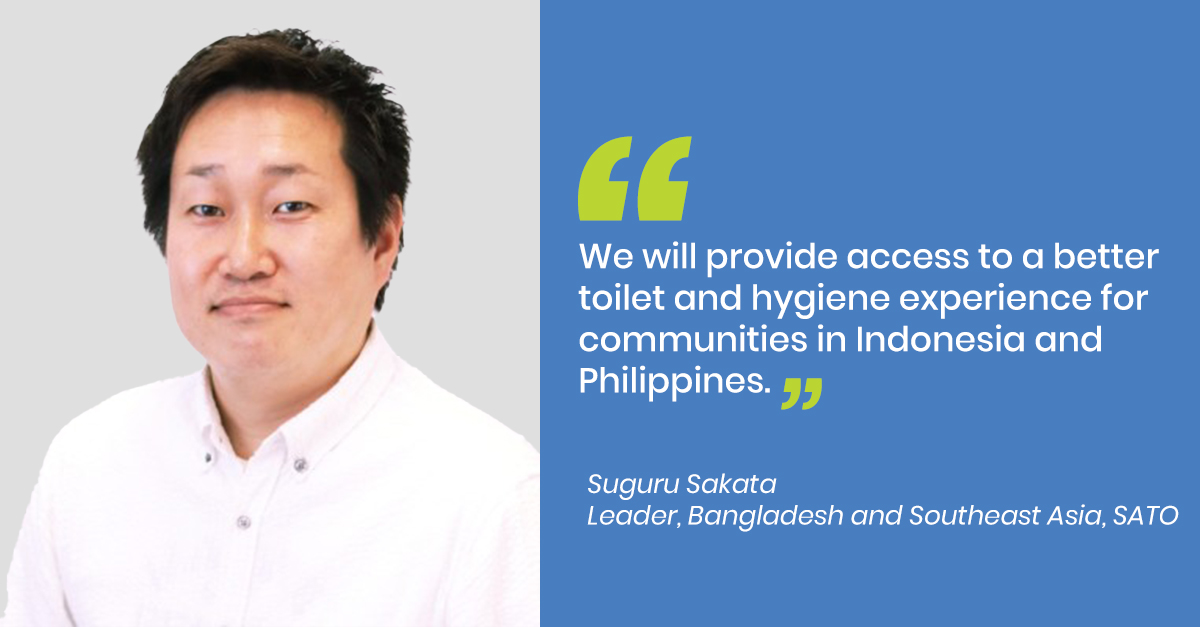
1.What has led to the expansion of SATO in Southeast Asia?
SATO has been at the forefront of creating sanitation solutions for communities that need them the most. After working in Asian countries such as India and Bangladesh, we turned our attention to the needs of Southeast Asia. In the Philippines, for example, more than 5 million people still defecate in the open. In Indonesia, the number is five times higher with 25 million people without access to basic sanitation, according to data from UNICEF & WHO Joint Monitoring Program 2017.
In these areas, households have issues with odor, clogging, and insects, which can cause discomfort while using toilets at home. They also face other major challenges, such as water scarcity.
At SATO, we believe that given the choice of safe, economical, and durable toilet solutions, people will choose to use toilets over defecating in the open. And so, we are entering this market to provide access to communities that deserve a better toilet and hygiene experience.
2. What are the focus countries in this expansion?
Currently, our primary focus is establishing our business in both Indonesia and the Philippines. In the future, we would like to expand further into Vietnam, Cambodia, and other Southeast Asian countries that require our sanitation and hygiene solutions.
3. What is the strategy for the launch?
Before we start commercial operations in any market, SATO begins by researching the local needs through pilot projects. In Indonesia, we have implemented donations with local NGOs and collected feedback on the products, helping us understand customer’s needs and wants.
The next step is to connect with the right supply partner. We aim to work with manufacturers who can produce and supply products at the local level. By driving the make-sell-use cycle, we seek to produce locally, generate employment and strengthen local economies at the same time that sanitation conditions are improved.
4. What will be the business model in Southeast Asia?
Globally, SATO works under two models: license and distribution. In the license model, the partner manufactures locally and works towards creating a robust retail chain. In the distribution model, the partner imports from other regions/manufacturers and works towards creating a solid sales channel.
In Indonesia and the Philippines, we are actively looking for a manufacturer who has experience manufacturing and distributing plastic products to rural and peri-urban areas.
5. Will there be a localized product line?
Given the feedback of the pilot phase, we believe that SATO’s existing products satisfy the needs of the customers in these regions. However, providing the right solutions and innovations is in our DNA. We have developed specific solutions whenever we identify an opportunity.
In India, for instance, we came up with a connection system with trap door technology that can be attached to a toilet pan, the twin-pit SATO V-trap, which removed the junction box, configuring the toilet to connect twin pits. This design makes switching between two pits easier, eliminating clogging problems. The innovative SATO V-trap connection system is created to replace the P/S trap system, reducing water consumption while eliminating the bad smells, flies, and insects inside the toilet.
As the brand grows in the region and receives more feedback, we will look into developing solutions to specific needs, whenever possible.
6. Can you explain the work you do on the ground?
SATO works with masons and plumbers by providing them with information and developing their skills so installations are well executed, and users can use their products comfortably. We have already started masons and plumbers training in Indonesia and are looking forward to collaborating with other local players.
We also work with local and international organizations to provide sanitation solutions that change lives for the better. We rely on local partners such as NGOs, masons, plumbers, manufacturers, retail, and even the government to play its part.
7. When can we expect to see the SATO products hit the market? And who will be heading the expansion?
We are expecting to see SATO launch by October 2021 in Indonesia and by January 2022 in the Philippines. I will be heading this expansion and would like to speak to manufacturer partners who would like to join forces with us. Please do reach to suguru.sakata@lixil.com
Has this Q&A inspired you to take part in bringing sanitation and hygiene solutions to more communities around the world? Contact us at sato@lixil.com for more information on how we can work together.